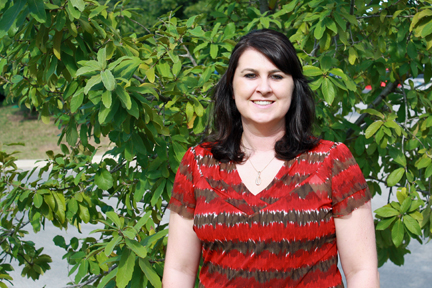Professor widely renowned for outstanding forensic expertise

Parish-Fisher has a background in forensic science.
Professor Casie Parish-Fisher is not only an instructor of forensic science and a Senior Forensic Scientist, but she also used to work full-time at the Combined DNA Index System (CODIS) Laboratory.
In a room filled with not only family portraits, but also autopsy photos of the infamous Bonny and Clyde, Professor Casie Parish-Fisher dove into discussing her career. Her Texas accent could not go unnoticed, as well as the country music that escaped through her computer’s speakers.
After growing up in the small town of Diboll, Texas, Parish-Fisher left to attend Baylor University for her undergraduate degree. At Baylor, she obtained a Bachelor of Science in Forensic Science.
A little over a year later, Parish-Fisher went off to school in Preston, England at the University of Central Lancashire where she obtained a Master of Science in DNA Profiling.
From September 2008 until last summer, she worked at the CODIS Laboratory for the Texas Department of Public Safety.
Parish-Fisher was a DNA Analyst at CODIS, which means she worked in a lab studying various forms of DNA that are found in specimens such as saliva or urine.
As a professor, she was a finalist for the 2010 Outstanding Adjunct Faculty Award. Parish-Fisher was one of five finalists out of all of the adjunct professors in the entire college.
While juggling teaching, Parish-Fisher has also been working on her PhD at The University of Central Lancashire. She flies back and forth from Austin to Preston, England and is expected to finish her doctorate in Forensic Genetic Research by May.
Parish-Fisher said that her biggest accomplishment career-wise was getting her workbook “Crime Scene Processing and Investigation” published with fellow author Christine Ramirez. The workbook was published in November of 2011.
Parish-Fisher said that both of her crime scene classes use this book and that other schools have been ordering the book as well.
Parish-Fisher believes that being straightforward is one of the best tools that she can use when it comes to teaching.
“I don’t sugarcoat things or make them glamorous,” Parish-Fisher said.
She also discussed how real-life forensic science is a lot different from what you see on TV.
“It’s not like people die when it’s 60-degree weather in a clean room,” Parish-Fisher said.
This extensive background and straightforward attitude has helped Parish-Fisher bring her real world experiences to her teaching.
“[Parish-Fisher] prepares her students for the real world of forensic science. She has given me opportunities that will help me better my career before I have even received my diploma,” Natalie Medders, a senior forensic science major, said.
Medders described an example of the guidance received from Parish-Fisher: “[She has me on a] piercing removal program. One piercing each semester is removed, leaving me piercing free as I walk across the stage for graduation.”
Another student of Parish-Fisher’s respects her teaching style.
“Her classes are very structured. I admire and respect that a lot. She is very strong on deadlines,” Austin Duncan, a junior forensic science major, said.
Parish-Fisher also talked about how she will be doing mock crime scenes all over campus this semester because the library is currently located where her mock crime scenes used to be.
“If you randomly see crime scene tape on campus, odds are it’s me– nothing serious,” said Parish-Fisher.






